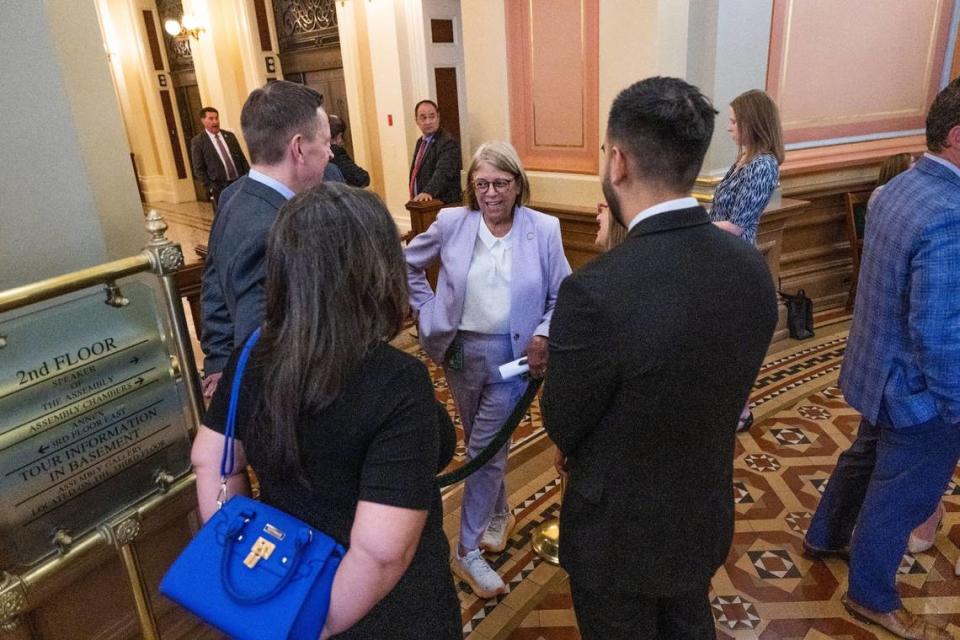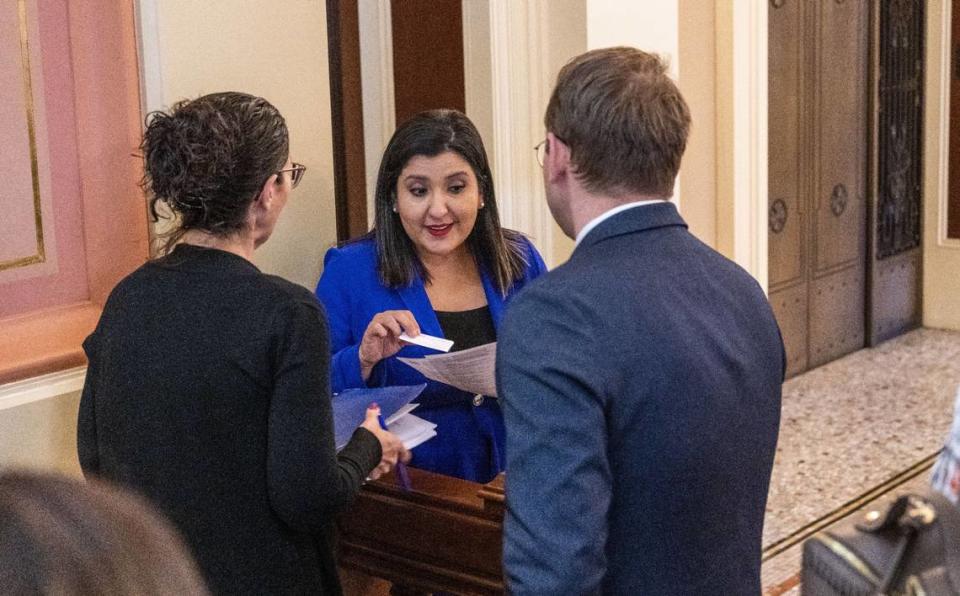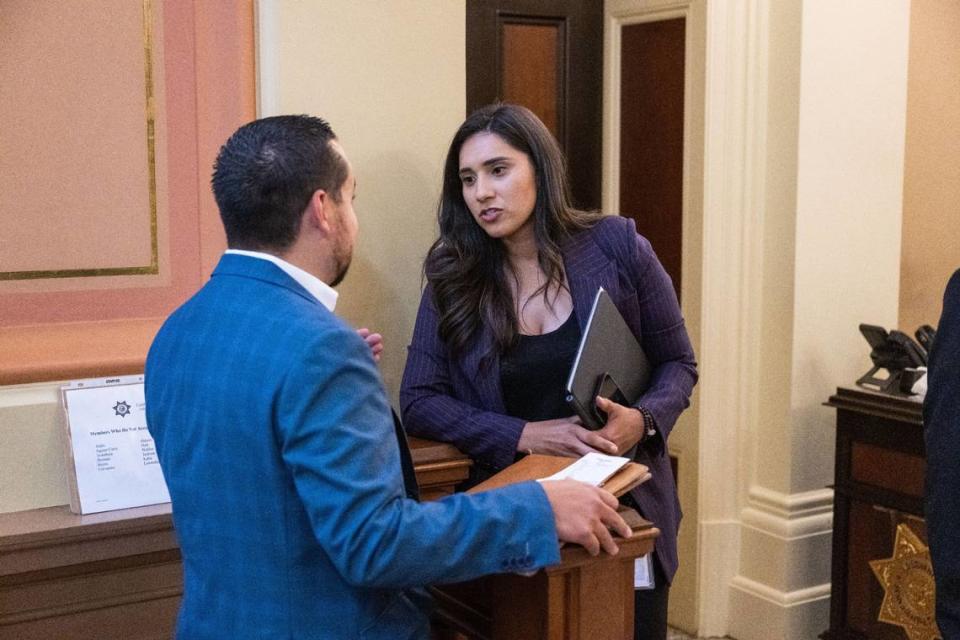How California lobbyists jam the Capitol for ‘high-pressure’ meetings to sway lawmaker votes
For California lobbyists, the final days of the legislative session are like a pressure cooker where the steam inside has been building for months.
The advocates paid to influence state lawmakers pack the Capitol rotunda in hopes of snagging some last-minute face time with Assembly members and senators as they cast their final votes for the year.
During these last days, the ornate second-floor balcony — normally populated by tourists, school groups and quinceañera portrait-takers — is overrun by people in suits huddled around large screens watching legislators conduct the state’s business.
They jam the wooden gates on the ends of the hallways leading to the Assembly and Senate chambers and hand business cards to the Sergeants-at-Arms standing guard, hoping they can convince lawmakers to come talk to them before crucial votes.

“One of the hardest parts of advocacy is this process, because it’s so high-pressure,” said Kristina Bas Hamilton, a lobbyist for KBH Advocacy, which works for advocacy and labor organizations. Bas Hamilton on was representing United Domestic Workers and supporting Senate Bill 616, which would increase the number of paid sick days for workers.
Their conversations with legislators and with each other echo through the Capitol along with the clanging of the bell that marks each Assembly vote.
Lobbyists representing a wide variety of interests — from city governments to criminal justice reformers to labor unions — have likely spent months building relationships with lawmakers and their staff. This is simply an opportunity to make their last pitches, Bas Hamilton said.
“With certain very high-level, controversial bills, a lot of members don’t make up their mind until the very end,” Bas Hamilton said. “And so you have to use every tool as a lobbyist, as an advocate that you have. And if they’re still not 100%, there is this opportunity.”

Lobbying logistics
This marks the second year lobbyists have used the rotunda for conversations with lawmakers. Before the COVID-19 pandemic and the Capitol construction project, they were relegated to a hallway in the now-demolished annex, said Chris Micheli of lobbying firm Aprea & Micheli, which represents businesses, trade associations and public agencies.
Both Micheli and Bas Hamilton called that setup more “hot and sweaty” and crowded than the high-ceilinged rotunda they began using last year, once in-person activity at the Capitol resumed.

Lobbyists are not allowed on the Assembly and Senate floors. The Assembly does not permit lobbyists to text members on the floor, Micheli said, although they can do so in the Senate.
This means the best way to get lawmakers’ attention is to write them notes on business cards asking for conversations and have sergeants deliver them to the floor. Lobbyists are not allowed to ask legislators to vote a certain way. They can write notes only to request discussions.
Clients expect lobbyists to be present when their bills are up for votes, Micheli said.
“Maybe I’m old school,” he said. “But my preference is is to look somebody in the face and say, ‘My client supports or opposes AB 123. What are you thinking? Have you taken a position on it?’”

Last-minute pitches
If lawmakers talk to lobbyists between votes, they frequently do so at the gates in front of the hallways to both chambers. During their brief meetings, they try to provide information on bill amendments, answer questions and push back against the other side’s arguments.
“That’s the hard part of it,” Bas Hamilton said. “Breaking through and getting attention in a space in which everyone’s clamoring for it.”
When asked whether the conversations are successful in changing legislators’ minds, lobbyists were mixed in their opinions.

Bas Hamilton said lawmakers have told her the last-minute information she gave them made a difference in how they voted.
“It can it can feel hopeless,” she said. “It can feel fruitless, because you don’t know, right? And the thing is, you have to respect that they’re human beings. And there’s only so much information a person can take in. At some point, you shut it all down. But then you hear that and you’re like, ‘OK, I know I did something.’”
Natasha Minsker, who lobbies for Smart Justice California and the Prosecutors Alliance of California, said it’s important to be present at the Capitol to try and sway lawmakers if there are last-minute surprises.
“I don’t feel like I have any choice,” she said. “I mean, the opposition’s here working against all my bills. I have to be here, even if it’s just to know who they’re talking to.”

Lawmakers and lobbyists
At the gate to the Assembly hallway, sergeants keep a list of lawmakers who do not accept lobbyist cards.
Assemblyman Marc Berman, D-Menlo Park, is among those legislators because he “(finds) it to be distracting and shouldn’t be where my focus is.”
“I’m skeptical of very, very last-minute information,” he said. “If you’ve been working on something all year, and know all the ins and outs of this policy, why is it that something comes up at the last minute? And at the last minute when I don’t have the time to be able to check the veracity.”
Berman’s desk mate, Assemblyman Jesse Gabriel, D-Woodland Hills, said he tends to ignore cards and has “never received them particularly well,” even though he understands why lobbyists use the tactic.

“I’ve always found it much more productive to sit down with someone in an office and talk in an organized fashion,” Gabriel said.
Assemblywoman Tasha Boerner, D-Encinitas, said she appreciates conversations with lobbyists because she “(likes) to be fully informed.”
Boerner said she also thinks it’s “respectful” to let lobbyists know where she stands on things. She has even used the conversations to dispel misinformation about her own bills.
“I can read the bill text, I can read the analysis, I can hear what my staff’s recommendations are,” Boerner said. “But sometimes there are specific things in my district, that maybe that information didn’t come up beforehand, and I think it’s important to get that information.”

